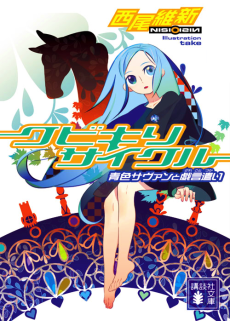KUBIKIRI CYCLE: AOIRO SAVANT TO ZAREGOTOZUKAI
STATUS
COMPLETE
EPISODES
8
RELEASE
September 27, 2017
LENGTH
30 min
DESCRIPTION
It's the vacation of a lifetime, a trip to a remote island filled with geniuses–and murder.
On Wet Crow's Feather Island, a tiny speck in the Sea of Japan, lives Akagami Iria, the exiled daughter of a powerful family. Born into great wealth, she was a princess of the highest pedigree–until she was cut off by the leader of the Akagami Foundation. For the last five years, she's lived on Feather Island with her maids. But she hasn't been alone. She has invited the best minds Japan has to offer to come and stay with her.
And so nineteen-year-old college student Ii-chan and his best friend, computer genius Kunagisa Tomo, find themselves as Iria’s guests at her elaborate mansion. Surrounded by fascinating women – a chef, a fortune-teller, a scholar, and an artist, not to mention his own friend Tomo – Ii-chan is feeling a little overmatched intellectually. But the sudden discovery of a grisly murder sends the island into shock. And Ii-chan discovers that he does possess a bit of genius: the ability to discover what is real and what is fake, who is who they claim to be and who is a killer.
(Source: Del Rey Manga)
CAST
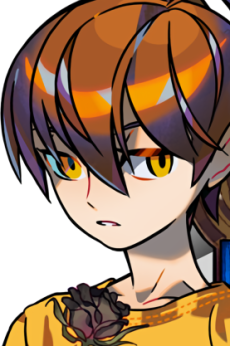
Ii

Yuuki Kaji

Tomo Kunagisa

Aoi Yuuki

Jun Aikawa

Yuuko Kaida

Akane Sonoyama

Yuu Shimamura
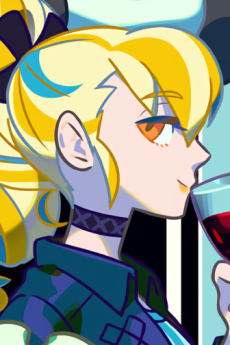
Maki Himena
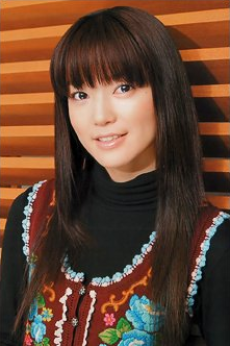
Aya Endou
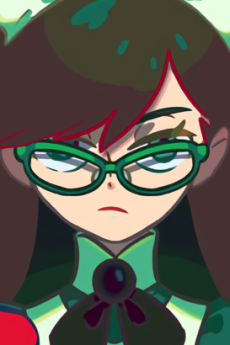
Teruko Chiga

Yuuko Gotou

Kanami Ibuki

Ayako Kawasumi
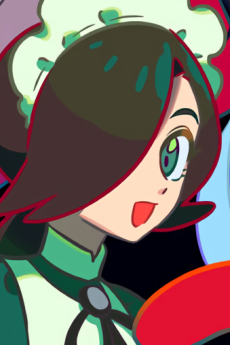
Hikari Chiga

Ryouko Shintani
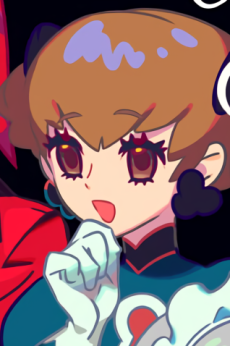
Iria Akagami

Mariya Ise
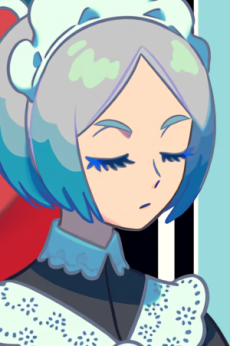
Rei Handa

Houko Kuwashima

Yayoi Sashirono

Haruna Ikezawa
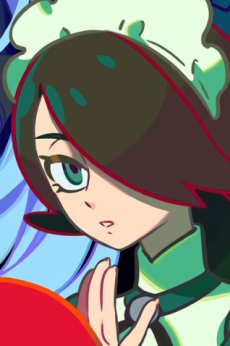
Akari Chiga

Natsuko Kuwatani
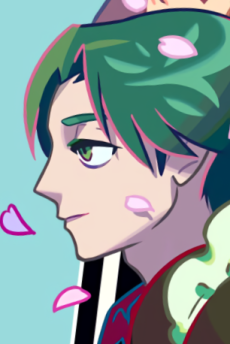
Shinya Sakaki
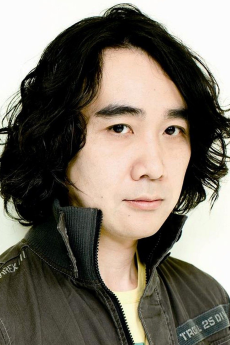
Kenji Hamada

Odette Akagami
EPISODES
Dubbed

Not available on crunchyroll
RELATED TO KUBIKIRI CYCLE: AOIRO SAVANT TO ZAREGOTOZUKAI
 MUSIC Slice of LifeGunjou Sekai
MUSIC Slice of LifeGunjou SekaiREVIEWS

mrworldwidetotoro
70/100NisiOisiN's contribution to the honkaku movement is mentally stimulating, visually volatile and thoroughly enjoyable.Continue on AniListDisclaimer: This review is mostly spoiler free.
Have you heard of the Japanese literary movement honkaku?
The term can be literally translated as “authentic” and refers to mystery novels that follow a high degree of logical reasoning and deduction. In addition to being literary compositions, they are almost like challenges from the author to the reader: “All the clues available to the detective are available to you too; can you solve the mystery before everything is revealed?”
This form of mystery writing reached its peak in the years immediately following World War II, but gradually fell out of favor as a new “social school” emerged, which tended to focus on the psyche of the culprits and eschewed honkaku’s quixotic settings in favor of natural realism. Honkaku has, however, undergone a revival of sorts lately, in no small part due to works that even western readers will be acquainted with such as Soji Shimada’s The Tokyo Zodiac Murders.
Yukito Ayatsuji, whom anime fans might recognize as the original creator of Another, has also written honkaku, but I digress. The aim of today’s article, of course, is to review Nisio Isin’s own contribution to the konkaku movement, The Kubikiri Cycle.
Animated by Shaft, it is likely no surprise to anyone that this show’s atmosphere is reminiscent of their earlier adaption of Isin’s Monogatari series. Some anime listing sites such as MyAnimeList have “dementia” as one of its genres, and while I don’t believe that to be the most apt description for Kubikiri Cycle, viewers would be forgiven for being baffled or puzzled by the show’s often schizophrenic visuals. Although it is not deeply explored over the course of the eight episodes (roughly only the first volume of the source material is covered), it is clear from the offset that the protagonist’s emotional well-being is in tatters, which is why I believe the show chooses to employ the visual technique it does. Having said that, armchair diagnosing fictional characters is not my forte.
The landscapes and environment that we see on screen is reflective of the characters’ state of mind as opposed to any objective reality. This can be shown when the protagonist engages in an extensive philosophical dialogue with another character whilst traversing the ends of the world and the underworld only to arrive at the apartment building of the one person he did not want to see. If we interpret the scene literally (to do so, in my humble opinion, is to completely miss the point of the series), then any semblance of consistency is lost; if we look at the scene as symbolism, then we come to the realistic conclusion that the voyage through hell is a metaphor for the very human act of gathering courage in order to face the reality of having to do something unpleasant.
For instance, how many inner demons do you have to fight before venturing into something unknown and possibly frightening?
In other words, the visuals cannot be interpreted simply as they are presented. The narrative’s dialogue heavy nature means that this is not a show that you can understand easily if your brain is switched off. As mentioned above, the series follows the honkaku rule of logical reasoning and deduction, so you will need to have your wits about you if your intention is to solve the mystery before the protagonists. As someone who has already finished the show, I can vouch for its sense of fair play – it is a mystery that can conceivably be solved by anyone who:
A) reads a lot of mystery novels and is already aware of the myriad tricks an author may use;
B) applies critical thinking.
To conclude, this is a series that I enjoyed and I would recommend anybody with similar tastes to give it a try. If you are looking for an intellectually stimulating mystery with morsels of deceptively idle philosophical chatter sprinkled throughout eight episodes, then you have come to the right place. If you enjoyed the Monogatari series, then this would also be right up your alley. If you prefer your entertainment to be straightforward and frank, then you’ll probably not enjoy this series on the basis that it is neither straightforward nor frank. But who knows?
PS: This show has one of the most fitting OPs I’ve seen in recent years. The Zaregoto light novels on which this show is based has been licensed for an English release, and while the show is perfectly fine and coherent as a standalone piece, perhaps you would be interested in the further adventures of the nonsense bearer and the blue savant?
PPS: This review was originally posted on my blog.

kathelynn
87/100Playing Among Us reminded me of this anime, and I thought I would review this because Murder Mystery is fascinating.Continue on AniListThis review is a tangent that doesn't concern the anime really (and so, spoilers free!), but hopefully, the amount of time I put into writing this should entice you into watching it. It is another favorite of mine by Nisio Isin, who wrote the Monogatari Series.
I thought this would be stupid considering I only remembered this anime through a game called "Among Us," but then I thought I would talk about how fascinating Murder Mysteries are. And how much I was fascinated by getting around the message of this anime into this review.
But-
Nothing is fascinating about Crime Fiction specifically, nor is there with Mysteries in general. Honestly, I barely even read or watch mystery novels in the first place. The thing is, it probably communicates with the audience more than it does, as my friend expressed that "the stories you can come up with, this anime tries to encourage it."
That's the starting point where I break the mold with mystery fiction, at least in conclusion. The narrative gives you a lead, lets you experiment with your evidence. It has to do with "how can I decode this particularly," which would make you feel great if you solved the mystery earlier than the protagonist (that dopamine stuff is nice). It goes back to the models of communication, where we have the sender and the receiver. It is like a comedy where everyone would have a good time if the message were clear and precise. And you were given an opportunity to investigate something even if it is outside your control.
And yet I generalized the whole mystery genre with a single anime like this. I believe I understood the premise, just as I was so sure I got the murderer in the first place.
But that's the point of getting the message across. Or is it?
It's hard to decipher what the author wants. Is it to break awareness, thinking outside of the box? Or is it to listen to their rants, where none can be accurate to the statement of straightforward just making up mysteries and solving them just as if we solved something crucial? We said it in another form: why do we break things and make things. It is asking the fundamental question of why engineering, why science exists. Why do we satisfy human knowledge? Or rather, why do we have an existential crisis?
The answer is: we really don't know. None of us knows what we're doing, why we're doing it, and when we're doing it. When we have a clue to that mystery alone despite our basis being too few, as long as there's confirmation bias: we have found ourselves a purpose.
The gratification of understanding everything around you, it sums up what mystery fictions are in general. All of this despite not reading much into it.
But what do I know?
What do I really know?
Even if you start to get everything piece by piece, the puzzle becomes bigger and difficult. You really can't be ignorant of those kinds of things, and it's probably a good part of growing up. And so the message of this anime, as to how I interpret it, is:
"You'll eventually learn when you learn."
In the end, I realized that I mostly referred to philosophy. And so I'd also refer to a short quote by Lao Tzu:
"Knowing others is intelligence, but knowing yourself is true wisdom."So I do know something.
Yes, I don't read much into Crime novels. A friend of mine that I mentioned recommended me to watch this since she thought I liked mysteries in general. Honestly, I am only an avid fan of lighthearted shows so I don't know if there's a better show out there, but for me, this is probably a good time to start tackling them after I finish philosophy. But I really liked this anime and so I thought I would dig deep and emphasize.

sportsandstuff
65/100The animation and directing style of Shaft fit perfectly to this story but the execution towards the end lacks.Continue on AniListSpoilers Ahead
Kubikiri Cycle is a simple mystery story in concept, a kid on an isolated island tries to solve a murder. This review is focused on what I see as the negatives of this anime, mainly things that occur in the last 2 episodes of the show. Before we get into that I would like to point out the positives and what I enjoyed about the story, because I did enjoy it especially up to those aforementioned last two episodes.
As I said in my review summary, Shaft's directing style and animation fit perfectly to this sort of psychological, dialogue-based mystery. If you have watched any of the Monogatari series it is very similar to that. This style works well because it provides interesting visuals as dialogue takes place. The odd animation also adds to the mystery because it is confusing and somewhat ominous in a way. For example, the table and weird moving clock thing in the dining room. Why is the table so damn big and why is there a giant moving clock thing in the background? Who knows. Either way, I like it. Also, the story and mystery in general were pretty well done. Different characters were hinted at to confuse the viewer who is the real culprit and for the most part it was not only difficult, but fun to work alongside Li in solving it. Besides that I especially like Kunagisa and Kaname as characters, but the rest of cast isn't bad either. I also do like Li's character development, many characters sort of push him towards finally realizing his true feelings for Kunagisa, and he understand them at the right moment. While getting attacked in Yayoi's room, he realizes he loves her and so he goes to protect her. At the very end of the story he also goes to Kunagisa's apartment which is nice.
Moving on to what I don't like, the main thing is the mystery reveal at the end. The reveal, of course, is the most important part and most difficult part to do well in any mystery. I like how the original solution to the mystery ended up not being correct, it was a nice twist. It was also nice because there were plenty of holes in the original solution (which Li said himself). My only question is why he would even leave the island and believe the solution was correct in the first place if there were holes in it. His own motto is "if there's no other solution this must be the answer no matter how unreasonable it seems" or something like that. So why then did he leave if there were other possible solutions? Plus, after "solving" the mystery the first time he (along with everyone else) just let Akane (actually Kaname) walk out free. Li, by the way, was the person pushing for the cops, the person saying that murder, no matter the cause, was unacceptable. And you're saying that he just let Kaname, a muderer, walk out free? Moving on to the actual solution to the mystery, first of all it's just way too drawn out and long. Aikawa just rolls in and gives an almost completely uninterrupted 30 minute speech. I don't care how interesting the visuals are, it simply isn't entertaining to sit and watch someone drone on and on for that long. Because of how boring this reveal was I missed details (because I zoned out). I know this is partially my fault but honestly I don't know how anyone could actually listen to that whole explanation and be entertained the whole time. The actual killer and whole mystery solution itself was interesting by the way, it was different and unexpected. The motivation, though, was dumb. If Kaname was so damn smart couldn't she just have got into the exact same position as Akane eventually without killing her?
All in all, this isn't an all around bad anime but it is definitely let down by the solution to the mystery itself and the way the mystery is revealed.
SIMILAR ANIMES YOU MAY LIKE
 ANIME ComedyBakemonogatari
ANIME ComedyBakemonogatari ANIME ComedyMekakucity Actors
ANIME ComedyMekakucity Actors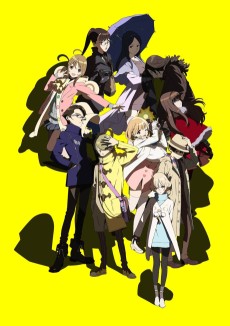 ANIME MysteryOccultic;Nine
ANIME MysteryOccultic;Nine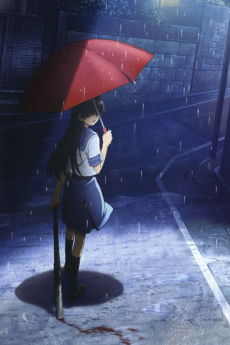 OVA HorrorDenpa Teki na Kanojo
OVA HorrorDenpa Teki na Kanojo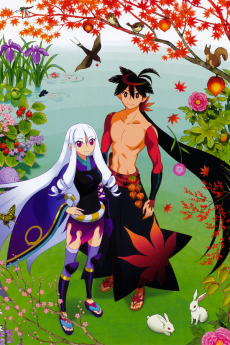 ANIME ActionKatanagatari
ANIME ActionKatanagatari ANIME MysteryDEATH NOTE
ANIME MysteryDEATH NOTE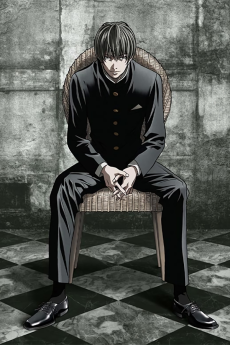 ANIME DramaAoi Bungaku Series
ANIME DramaAoi Bungaku Series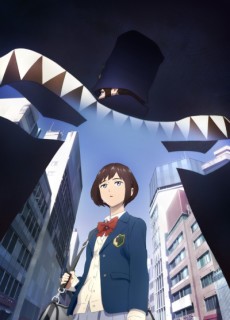 ANIME HorrorBoogiepop wa Warawanai
ANIME HorrorBoogiepop wa Warawanai
SCORE
- (3.85/5)
TRAILER
MORE INFO
Ended inSeptember 27, 2017
Main Studio Shaft
Favorited by 807 Users
Hashtag #クビキリ才クル


